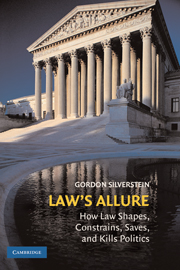Book contents
- Frontmatter
- Contents
- Acknowledgments
- LAW'S ALLURE
- Introduction: Law's Allure: The Juridification of American Politics and Public Policy
- PART I LAW'S ALLURE: WHY, WHY NOW, AND WHY IT MATTERS
- PART II LAW'S ALLURE: PATTERNS, PROCESS, AND CAUTIONARY TALES
- 4 Poverty and Abortion: The Risks and Rewards of a Judicial Strategy
- 5 Environmental Regulation: A Constructive Pattern
- 6 Campaign Finance: A Deconstructive Pattern
- 7 The Separation of Powers: When the Court Says Yes – and No
- 8 War Powers and Precedent: When the Court Is Reluctant to Intervene
- PART III LAW'S ALLURE: COSTS AND CONSEQUENCES
- Conclusion: The Promise and Peril of Law's Allure
- Bibliography
- Index
- References
8 - War Powers and Precedent: When the Court Is Reluctant to Intervene
Published online by Cambridge University Press: 05 June 2012
- Frontmatter
- Contents
- Acknowledgments
- LAW'S ALLURE
- Introduction: Law's Allure: The Juridification of American Politics and Public Policy
- PART I LAW'S ALLURE: WHY, WHY NOW, AND WHY IT MATTERS
- PART II LAW'S ALLURE: PATTERNS, PROCESS, AND CAUTIONARY TALES
- 4 Poverty and Abortion: The Risks and Rewards of a Judicial Strategy
- 5 Environmental Regulation: A Constructive Pattern
- 6 Campaign Finance: A Deconstructive Pattern
- 7 The Separation of Powers: When the Court Says Yes – and No
- 8 War Powers and Precedent: When the Court Is Reluctant to Intervene
- PART III LAW'S ALLURE: COSTS AND CONSEQUENCES
- Conclusion: The Promise and Peril of Law's Allure
- Bibliography
- Index
- References
Summary
It has long been assumed that the Supreme Court plays a far more limited role in foreign policy in general and war and emergency powers in particular than it does in other areas of public policy. Although it is true that the Court has made far fewer dramatic interventions in this area, juridification in war and emergency powers is still significant. The Court may send relatively few signals, but those that are sent powerfully shape and constrain the choices made by the elected branches. This chapter explores one important example of the juridification of war and foreign policy where the Court has remained relatively silent (the effort to formalize, rigidify, and automate the allocation and exercise of the war powers starting in 1972). The chapter then turns to focus on the expansion and acceleration of claims for prerogative powers made by modern presidents, particularly those made by the George W. Bush administration since September 11, 2001. These efforts were designed to win support – or at least acquiescence – from the Supreme Court. But these signals were misread in cases involving detainees in Guantanamo Bay, Cuba, and the chapter concludes with a close look at the 2008 case of Boumediene et al v. Bush, which suggests that a relatively silent Court is not a weak or insignificant Court. In foreign policy and war powers, it might be more useful to think of the Court as a fully charged capacitor, a repository of enormous power and energy, that can be triggered by those who misread its signals.
- Type
- Chapter
- Information
- Law's AllureHow Law Shapes, Constrains, Saves, and Kills Politics, pp. 209 - 242Publisher: Cambridge University PressPrint publication year: 2009



